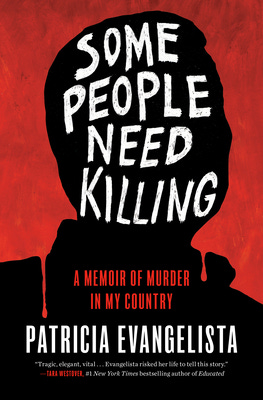What Happens When We Let Them?
October 20, 2023 - The US role in the Philippines - and the book giveaway is back!
Happy birthday Sarah!
This week Maya Calleja Scott joined me to write the lede. Maya is a junior at Bard College Berlin, majoring in Ethics and Politics. She’s spending the semester in NYC with the Bard NYC program. Our lede is directly related to this week’s book giveaway!
Next week, I’m headed to Denver for the 2023 Denver Democracy Summit. I’ll be on a panel on Thursday, October 26 talking about the future of democracy 👀 and how to navigate global challenges. You can stream the conversation live at 2:45 MT/4:45 ET. Register here.
“What happens when autocrats and dictators rise and we let them?” Patricia Evangelista poses that question in her new book, Some People Need Killing. On one level it’s a look at the drug war — the reign of terror that former Philippine president, Rodrigo Duterte, waged during his tenure (2016-2022). At the same time, it also forces us to think about how autocrats such as Duterte catapult to power.
In the case of the archipelago nation, part of the answer is rooted in foreign policy. Specifically, US foreign policy.
US history in the Philippines started in 1898 when Spain was forced to sell the territory to the Americans with Filipino backing. Filipinos believed that the US would grant them independence. Instead, the US placed the country under its authority until it eventually gained independence in 1946. Even then, the US continued its presence in the country through military bases. These bases played a critical role in the US’s Cold War strategy — and are responsible for bringing to power the dictator who ruled over the Philippines from 1965-1986, Ferdinand Marcos.
Marcos stole, killed, tortured, and trounced on human rights. In 1972, in the face of opposition and questions of corruption, he placed the country under martial law for 14 years. Not only did the US not oppose this, it increased aid to the country.
Maya’s family is from the Philippines. Her Lolo (grandfather) was a microbiology professor at the University of the Philippines and was openly opposed to the Marcos regime – he even wrote a play about the regime. (It wasn’t the David Byrne play on Broadway…) He subsequently moved his family to Canada in 1975 to avoid persecution.
Marcos was eventually deposed in 1986, following the People’s Power Revolution, where millions of Filipinos rose up against Marcos and his corruption. Unfortunately, that has been set back.
Just as in the Cold War, the Philippines continues to be a player in the great power game, this time between the US and China. Eager to show dominance, both countries have stepped up their military presence in the South China Sea. The result has been the resurrection of autocrats and another Ferdinand Marcos.
Rodrigo Duterte came to power the same year as Donald Trump, with a “tough on crime” message that tends to resonate with people everywhere. Tough he was, cracking down on citizens and committing extra-judicial killings, which Evangelista writes about. All the while, the US continued to pour billions in military aid and arms to his government. Washington talks a big talk on human rights and democracy, but finds it hard to embrace it when its own power is at stake.
Last year, Filipinos elected “BongBong” Marcos — Ferdinand’s son. The circumstances surrounding his win are suspicious (vote buying is common throughout the country). What is clear is that the hopes and efforts Filipinos put into the People’s Power Revolution are being extinguished, largely because of US foreign policy.
The Philippines was built on the backs of colonized people. Not only does the US have an unacknowledged violent and repressive history with the country, but it also continues to use taxpayer dollars to fund violent dictatorships, military operations, and the murders of thousands of innocent people. It is crucial for Americans to look into how their dollars are used, especially if the US wants to parade itself around as the “defenders of democracy.”– Elmira & Maya
📚 Interrupt Your Bookshelf 📚
Enter our drawing for Patricia’s book, Some People Need Killing. The drawing closes on Monday, October 23, 2023 at 9:00am. Only those submissions with a full name and address will be considered.
Elsewhere in the World.....
On our radar...
The Indigenous voices proposition in Australia failed. The country, Lorena Allam writes, will continue to be a place “where the voices of First Nations people are drowned out, talked over and misrepresented in a national conversation that is forever about us, without us.” (The Guardian)
Poland held elections last weekend. It recorded the highest voter turnout and helped defeat the populist right-wing government. That’s a big deal. And reason to have hope for democracy, says Jennifer Rubin. (Washington Post)
Ecuador elected its youngest president, who is 35. Vanessa Buschschluter reports. (BBC)
This weekend, Argentines go to the polls to elect a new leader. With inflation at 138 percent and the peso at an all-time low, people have started to rally around a libertarian who called Pope Francis a “filthy leftist.” Eliana Raszewski reports. (Yahoo!)
Israel-Palestine
What is Hezbollah? Kali Robinson dives deep into the Shiite Muslim political party and militant group in Lebanon. (CFR)
Hezbollah has not yet guaranteed any support for Hamas, though they could open a second front against Israel in the North. Randa Slim fills us in on why they haven’t and what could cause them to in the future. (Middle East Institute)
To understand Hezbollah’s actions, look at Iran. The militant group is in a watch and wait mode, says Kim Ghattas, and just might be willing to sacrifice Hamas in order to save Hezbollah. (The Atlantic)
America overreacted and overreached after 9/11. Israel would be wise to learn from the US’s mistakes now, says Sarah Yager. (Foreign Affairs)
US officials need to take a stand on Israel’s violations of international law in Gaza, says Ananya Agustin Malhotra. (Inkstick Media)
Isabel Kirshner on the growing distrust that Israelis have towards the government. (NYT)
The Western response to the Israel-Palestine situation is rooted in racism and colonialism, argues Hanine Hassan. (Middle East Eye)
Where does China stand on Israel-Palestine? Koh Ewe weighs in and explains the role China could play, but hasn’t yet. (Time)
US
The US-EU summit takes place this weekend. Agathe Demarais on why it matters to climate change and the war in Ukraine. (ECFR)
Few people seem to think Kamala Harris is ready to be president. Why? Elaina Plott on the criticisms and challenges the vice president faces. (The Atlantic)
Africa
In Manono, DRC, lithium mining has become known as the new “white gold” industry. Lithium is crucial for building electric car batteries, so it has gained popularity with green energy campaigns. Behind the mining scene, however, are the poor living conditions of local mining families and unclear guidelines from foreign companies. Sophia Pickles, Janvier Murairi Bakihanaye, and Jack Wolf dive in. (New Lines Magazine)
The UN Human Rights Council concluded its 54th session last week. Unfortunately, it left one issue unresolved: the situation in Ethiopia. Antonia Mulvey and Kristy Hare on how the failure to not only renew the International Commission on Human Rights Experts on Ethiopia, which expires in December, but the failure to discuss the ongoing crimes against humanity will contribute to further violations. (Just Security)
As a result of generations of unequal power structures, African women in the field of economics are grossly overlooked. In order to address the problem, Fatimah Kelleher and other women gather knowledge into the Afrifem Macroeconomics Collective which curates African women’s knowledge sources on the economy all in one place. Check it out the next time you’re doing research: NAWI Collective. (Africa is a Country)
Asia
While Biden met with Benjamin Netanyahu, Russia’s Vladimir Putin met with China’s Xi Jinping at the Belt and Road Initiative Forum. BRI turns 10 this year. Amy Hawkins and Rhoda Kwan on what the meeting yielded and the challenges posed to the West. (The Guardian)
Simone McCarthy outlines a number of takeaways from the BRI summit, including the fact that Xi is da man. (CNN)
Being a single mother anywhere is tough. In China, it also presents practical challenges. Unwed mothers are not able to register for birth certificates, which means the child cannot go to school, get vaccinated, or get a passport. To reverse low birth rates things are starting to change. Lijia Zhang points out that a good place to start is to ensure equal rights for single mothers. (South China Morning Post)
New Zealand elected a right wing government. It will be a few weeks before a government is formed. Lucy Craymer on what comes next. (Reuters)
The Americas
US diplomats headed down to Mexico City earlier this month to discuss migration and trafficking. Stephanie Brewer, Vanda Felbab-Brown, Earl Anthony Wayne, Gary Hale, and Raúl Benítez Manaut catch us up on what went down. (The Dialogue)
A leading feminist activist in Chile is concerned that the current draft of the constitution will be even more limiting to women and minorities than the current one. Chileans are likely to vote on it in December. Marina Franco discusses. (Axios)
Earlier this month, the UN Security Council gave Kenya the green light to send its police force to Haiti. Will it help? Catherine Osborn takes a look. (Foreign Policy)
Europe
Can the EU be a global actor without Turkey? Ana Palacio says maybe not. (Project Syndicate)
After Azerbaijan recaptured the majority Armenian enclave of Nagorno-Karabakh on September 28, Shireen Hunter warns that this may have created new tensions with the possibility of more conflict. (Responsible Statecraft)
Many are worried that Russia will pull out of the Comprehensive Nuclear Test Ban Treaty. Russia’s lower house of the Parliament, the Duma, voted 412 to 0 to revoke ratification of the treaty. Isabel van Brugen explains the potential consequences of the vote. (Newsweek)
Does the Middle East conflict threaten Zelensky’s efforts to protect Ukraine? Maybe, says Frida Ghittis. (CNN)
Science and Climate Change
How can we discuss decarbonization while gas remains central to the economy of many BRICS nations? Vicki Knott discusses. (International Policy Digest)
Technology
Elon Musk is really scared about the low birth rate and it seems that he might be trying to take on the problem by himself, as he is the father of at least 10 children. Musk’s pronatalism and the whole movement is bad news, as it increasingly seeks to control women’s bodies, explains Andrea Becker. (Slate)
Links We Loved....
A warm soup keeps the cold away — here is a quick and easy chicken noodle soup recipe in case you need it!
Check out these pictures of that annular solar eclipse over the weekend that caused a “ring of fire.”
Opportunities
If you have an event, grant, or other “opportunity” to share with our community, please send it my way.
Either NYC or DC, go work for Alight as the Director, Global Partnerships & Global Affairs.
Inkstick has two roles: (1) Managing Editor for its growing, groundbreaking online magazine. Deadline is October 23, 2023. And (2) Domestic Extremism Reporting Fellow.
Looking to have your analysis published on a hot topic? A new foreign policy journal, the Jerusalem Strategic Tribune, is looking for 1500-2000 word essays on international security issues. Please see the link for examples of recent articles. One of our newsletter subscribers is an Associate Editor, and you can email her at pforzheimera@gmail.com for more details. The journal's politics are moderate and they are looking to expand out of Middle East issues.
Editorial Team
Elmira Bayrasli - Editor-in-Chief
Editors:
Samantha Felman
Pin-Shan Lai
Catherine Lovizio
Maya Scott
Emily Smith







